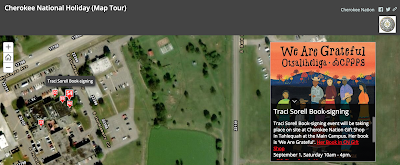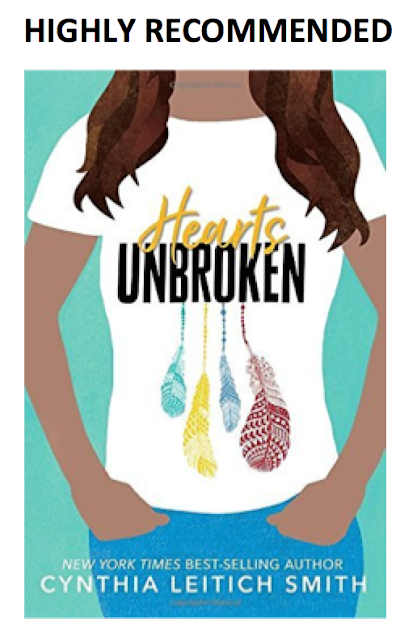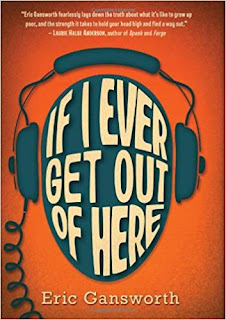I'll start by echoing the title of this post. I highly recommend Cynthia Leitich Smith's
Hearts Unbroken. Lou, the main character, is a senior in high school. There's a lot in here that I love, for several reasons. There are spoilers below, so you might want to read the book and come back, later.
My ARC (advance reading copy) of
Hearts Unbroken book has so many corners turned up or down. See? The top end looks that way, too.
I wasn't marking my place. I was marking a page that has something I want come back to. Something that moved me--to a smile, a squeeze of my heart, a laugh, or an UGH--because it captured life for so many Native teens who most of America doesn't see, even though they are right there, in front of you.
By that, I mean that Native people are everywhere. Too much of America thinks that we no longer exist. Or that if we did make it to 2018, we are living in some remote place. In a tipi. And that we have dark skin. And long black hair. And high cheekbones. And wear fringe and feathers. Today, in 2018. 24/7. If that is what you expect, you're hurting Native and non-Native kids and teens in your schools and libraries.
The Native kids in your schools and neighborhoods may be invisible to you but they see a lot that is also invisible to you.
For example, most people see right past the hurt embodied in an "Indian" mascot. Most don't even see the stereotyping in the "Indian" woman on the butter they buy at the grocery store (yeah, I'm talking about Land O'Lakes). A lot of Native kids see these things. Their families see them, too...
****
Here's the description of
Hearts Unbroken:
When Louise Wolfe’s first real boyfriend mocks and disrespects Native people in front of her, she breaks things off and dumps him over e-mail. It’s her senior year, anyway, and she’d rather spend her time with her family and friends and working on the school newspaper. The editors pair her up with Joey Kairouz, the ambitious new photojournalist, and in no time the paper’s staff find themselves with a major story to cover: the school musical director’s inclusive approach to casting The Wizard of Oz has been provoking backlash in their mostly white, middle-class Kansas town. From the newly formed Parents Against Revisionist Theater to anonymous threats, long-held prejudices are being laid bare and hostilities are spreading against teachers, parents, and students — especially the cast members at the center of the controversy, including Lou’s little brother, who’s playing the Tin Man. As tensions mount at school, so does a romance between Lou and Joey — but as she’s learned, “dating while Native” can be difficult. In trying to protect her own heart, will Lou break Joey’s?
Lou, we learn on page 7, is a citizen of the Muscogee Creek Nation. She reminds her then-boyfriend, Cam, of that fact when he goes on about how his mom doesn't like Andrew's (his brother) fiancée because "the girl is a Kickapoo Indian, so, you know" (p. 6). Lou asks for more info, and Cam says that the girl wants Andrew for his money (Cam's family is rich). Then he says that his mom thinks that Kickapoo sounds like a dog (p. 7) : "peekapoo or cockapoo. Get it?"
Ugh. Cam is speaking to Lou as if her Native identity is of no importance. And then he claims to be "part Cherokee." What will Lou did with any of that?! What does any Native teen--where hears this sort of thing--do with it?
Lou is upset about all of that but tries to stay calm.
Staying calm is a cost to her. It is a cost to other Native teens, to, when people around them don't realize they are, in fact, Native or that a Native identity has tremendous significance. Later in the book, Lou has a heck of a mess to deal with when she tries to tell Joey (her boyfriend) that she's Native. She thinks he doesn't know. He does, and that all works out fine, but it is the struggle that Lou has that makes me think that
Hearts Unbroken will be embraced by Native teens like Lou.
When and why would a girl like Lou speak up about their identity, or about something they see or hear that is stereotypical, or biased, or outright harmful? What are the costs, to Native kids, when they share their Native identity with peers or teachers who don't know enough about Native peoples to understand the significance of being a Native teen, today? What do they risk when they speak up? Sometimes, it is easier to just be quiet. But what is THAT cost?
****
The description (above) of
Hearts Unbroken is primarily about
The Wizard of Oz. The movie was part of my childhood, growing up on our reservation. The movie and book are, even today, everywhere. I always thought it was a bit creepy. Maybe it was just too White. In the author's note, Smith writes that she didn't know--until she was an adult--that L. Frank Baum was racist. I learned that, too, as an adult.
In
Hearts Unbroken, Lou's brother, Hughie, is in a tough spot when he learns about Baum. Does he stay in the play? Be the Tin Man, thereby standing in solidarity with the other cast members, against the racist townspeople who think Native and students of color ought not be playing those White roles?
I had such a lump in my throat as I read through those parts, and my heart swelled with Hughie's decision.
And I think Smith did all of that with such care! Lou and Hughie's parents knew about Baum but they let Hughie learn about it on his own. They were there to support him once it became known to him. But they let him sort through it. My heart clenched, thinking about all the Native parents all across the country who make these kinds of decisions all the time. Bring it up? Or not? Like Lou's struggle with her identity. Speak up? Or not?
That is Native life.
There's so much love and warmth and reality all through
Hearts Unbroken. And so much hope! And some absolutely terrific ground-breaking moves! On page 122, my heart (hmm... I've written the word 'heart' a lot in this post. That's worth pondering!) did a flip. I was reading
Hearts Unbroken in an airport and when I read page 122, I wanted to stand up and shout out "HEY EVERYBODY! Eric Gansworth's book is in THIS book!" At that point in the story, a library aide gave Lou a book that Hughie had asked for:
The novel for Hughie was If I Ever Get Out of Here by Eric Gansworth of the Onondaga Nation. It was lacking a clear protective jacket cover or any library catalog markings. The price sticker on the book was from an independent bookstore in Lawrence.
There's a lot in that passage. First, of course, my joy at seeing Gansworth's book get that attention in a book by another Native writer. That's a huge move on Smith's part. There's a lot of books for kids that reference racist ones, like
Little House on the Prairie or
Gone With the Wind. Writers who write those books insert a reference to those two books from a place of nostalgia that--in fact--does a disservice to Native and African American readers, in particular, because the stereotyping and bias in those two books is harmful to them. That is not what Smith did, though. What she did was help readers find a book by another Native writer that can reflect their lives as Native youth in the US.
I have a lot more to say about
Hearts Unbroken that I will save for later. Clearly, I love this book and highly recommend it.
Hearts Unbroken by Cynthia Leitich Smith is published by Candlewick and will be released in October. Pre-order it!












